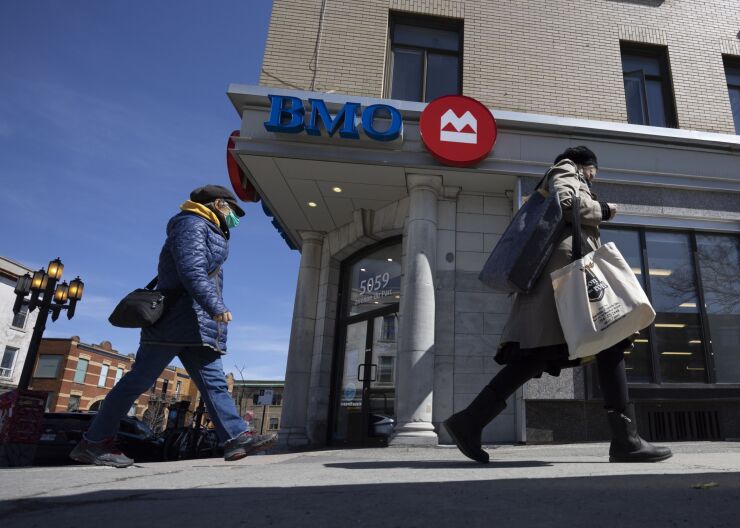
With many companies cutting costs, new potential uses are emerging for
This week, Mastercard partnered with BMO Commercial Bank to enable U.S. and Canadian businesses to create and push virtual cards directly to their employees' mobile wallets for in-store purchases. The bank and card network are collaborating with business payment fintech Extend to issue the cards.
Virtual cards can be offered to a wide range of employees — including those outside of management roles — with granular spending controls and greater visibility into a company's payment activity, according to Mastercard, which is expanding its
The collaboration comes as many businesses face an uncertain economic outlook. This week,
Businesses oftentimes do a poor job of reducing expenses. In periods of lower economic growth, only 9% of companies cut expenses in a manner that frees capital for future investment, according to the
"The cost of capital is very high right now," said Marie Elizabeth Aloisi, executive vice president of U.S. commercial payments and health care solutions at Mastercard.
By linking to the user's own digital wallet for contactless payments, the bank is offering business clients the ability to control spending remotely through an app while digitizing receipts and reconciliation in both online and offline channels. "Treasurers are worried about capital. Virtual cards provide an extra tool to manage expenses," Aloisi said.
Mastercard hopes virtual cards can be used for simple expenses such as a supervisor dispatching an employee to order lunch for staff, as well as more complicated expenditures such as airfare and hotels.
"Enabling corporate cards for mobile wallets is the next step in digitizing business payments," said Aloisi, adding that the virtual cards use Mastercard's inControl technology to mitigate fraud and overspending and to ensure compliance.
BMO is Mastercard's first issuer to offer contactless virtual cards for in-store payments; the technology is more common for online and in-app purchases. BMO and Extend first partnered in 2022 to automate vendor payments.
"Virtual cards have more data," said Derek Vernon, head of treasury and payment solutions product modernization for BMO Commercial Bank. "You can see where the card was issued and where it was used. The virtual card can't be used for anything else."
BMO is Mastercard's largest issuer in Canada and one of the 15 largest issuers in the U.S. This scale offers a path for the card network and bank to expand overall virtual card usage by applying the concept to corporate spending for smaller, more regular expenses.
"It's a transformation step for how people will use virtual cards," Vernon said. "An employer can issue a card that enables staff to use their phones just as they would for any other purchase."
The competition among payment firms to supply virtual cards for corporate use is heating up, as is the demand. Two-thirds of corporate travel planners say remote work is
Beyond its own quest to cut costs, BMO faces competition from fintechs such as Block and Stripe that provide payment technology for businesses.
"In this hyper cost-conscious environment, delivering improved spend management is a competitive differentiator," said Patricia Hines, head of corporate banking and payments at Celent. "Virtual card issuance allows banks to offer spend management down market."
Mastercard has invested in Conferma Pay, a fintech that develops virtual card technology, as part of the card network's strategy to expand virtual cards to corporate clients.
"Virtual cards are being used more broadly for lower-value transactions by a much broader set of employees," said Guillaume Bouvard, a co-founder of Extend. "So it's not just the CFO and executives, but all employees. It can be a turning point for B2B payments, making it accessible to more people."
Visa's clients for corporate virtual cards include Wells Fargo, Umpqua and Emirates Bank, among others. Visa's virtual card partnerships also include Confirma. Like Mastercard, Visa has
Small businesses have been historically underserved in this area and are often in dire need of this type of service, according to Hines, adding that digitalization overall has been democratizing access to corporation-level banking services.
"Although spend management, including virtual cards, are typically reserved for large corporations, the Extend solution includes a number of features not commonly present in large corporate platforms," Hines said. "Real-time transaction activity and notifications, easy enrollment, mobile wallet support, and automatic reconciliation are attractive features for any size business."






